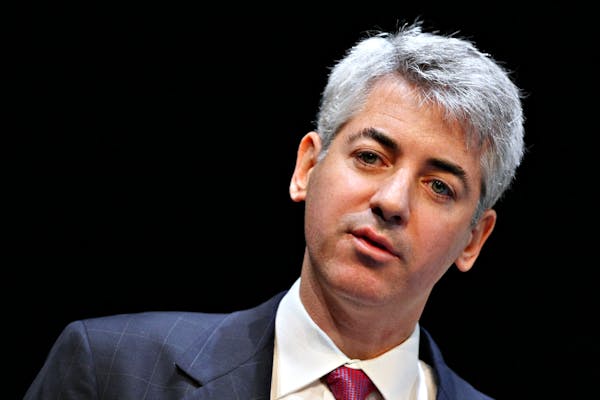Target Corp. has made its name by pushing the edges in fashion, store design and advertising. Now, one of Target's biggest shareholders is pushing it to be financially edgy as well.
On Wednesday, Wall Street tycoon Bill Ackman and his Pershing Square Capital Management laid out a proposal that would spin off Target's land into a stand-alone real estate investment trust (REIT), unlocking the value of a real estate portfolio Ackman said is worth $39.1 billion.
Target would sign 75-year leases with the REIT, giving Target the freedom to do whatever it wished with the buildings atop the land -- tear down structures and rebuild, remodel or expand.
It's a setup that hasn't been tried before, and Ackman acknowledged that he is asking the board of directors "to do something transformational for the company."
Ackman owns nearly 10 percent of Target's stock, and he predicted the move could double the stock's price within a year. Shares closed up 5.7 percent to $40.72 on Wednesday. Target shares have fallen dramatically since Ackman disclosed his stake, from more than $70 in July 2007 to about $32 on Monday.
Target, which has long underscored the strategic importance and flexibility in owning its land, indicated in a statement that it still has serious reservations about the proposal, which would need to be approved by its board and by regulators. Among the company's concerns: Ackman's estimates on the REIT's worth and being bound to long-term lease obligations. It also believes its debt ratings, borrowing costs and liquidity could take an unacceptable hit.
Ackman downplayed those issues. He said Target's credit rating could drop, but it would be a "temporary downgrade if it occurs at all" and that Target would regain its A rating "within two years."
About 85 percent of Target stores sit on land it owns, the highest percentage of any retailer. Wal-Mart owns about 63 percent of its real estate, ranking it fifth.
Ackman said that the proposed REIT, which would become the largest in the country, would be "a strategic partner -- a friendly landlord."
Tax benefits -- and hefty rent
Even though Target would pay $1.4 billion in rent and annual increases, it no longer would pay acquisition costs, and could see some tax benefits to being a renter instead of an owner, Ackman said.
Ackman, who created a fund for the sole purpose of buying more than $2 billion worth of Target shares, said taking his plan public was "incredibly friendly" and that his relationship with Target has been open and respectful -- something that should be a "new model for how activist shareholders should work with companies."
Ackman's proposal comes at a time when Wall Street is hardly in the mood for anything exotic. Consumers are holding back on everything but the essentials, cutting into sales of furniture and household goods. And as customers' debt and credit bills soar, Target and other credit agencies are having to write off more bad debts.
With the certainty of one who has management's ear, and a vested interest in shoring up a money-losing holding, Ackman boldly predicted that Target would sell the balance of its credit-card receivables portfolio -- about 53 percent -- by the end of the year. The likely suitor of the $8.7 billion portfolio would be J.P. Morgan Chase, which bought 47 percent in May for $3.6 million.
"It sounds like voodoo, like you're coming up with money out of nowhere by changing who owns something," said Joseph Beaulieu of Morningstar in Chicago. "That's not the case, but I'm still trying to wrap my head around it."
Jackie Crosby • 612-673-7335

Senate passes bill forcing TikTok's parent company to sell or face ban, sends to Biden for signature
USPS commits to rerouting Reno-area mail despite bipartisan pushback and mail ballot concerns

